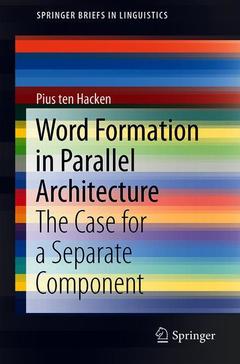Word Formation in Parallel Architecture, 1st ed. 2019 The Case for a Separate Component SpringerBriefs in Linguistics Series
Auteur : ten Hacken Pius

The position of morphology in the architecture of grammar has always been an issue of debate in generative linguistics. Since Chomsky (1970), this question has been framed in terms of the Lexicalist Hypothesis. Compared to Chomsky?s architectures, Jackendoff?s Parallel Architecture places phonetic and conceptual structures at the same level as syntactic structure, i.e. connected by bidirectional linking rules rather than interpretation rules. One of the consequences is that PA does not formally distinguish lexicon entries from rules of grammar. This changes the setting for the question of the autonomy of morphology, because the Lexicalist Hypothesis depends on this distinction.
Introduction.- The Mental Lexicon in Jackendoff’s Parallel Architecture.- Morphology in Jackendoff’s Parallel Architecture.- Productivity and Onomasiological Coercion.- The Boundaries of Word Formation.- Conclusion.
Presents Jackendoff’s treatment of the mental lexicon and word formation and then widens the perspective by way of examples
Explains the concept of onomasiological coercion and incorporates it into Jackendoff’s Parallel Architecture
Accounts for the different kinds of productivity in syntax and in word formation
Date de parution : 06-2019
Ouvrage de 99 p.
15.5x23.5 cm
Disponible chez l'éditeur (délai d'approvisionnement : 15 jours).
Prix indicatif 52,74 €
Ajouter au panier


